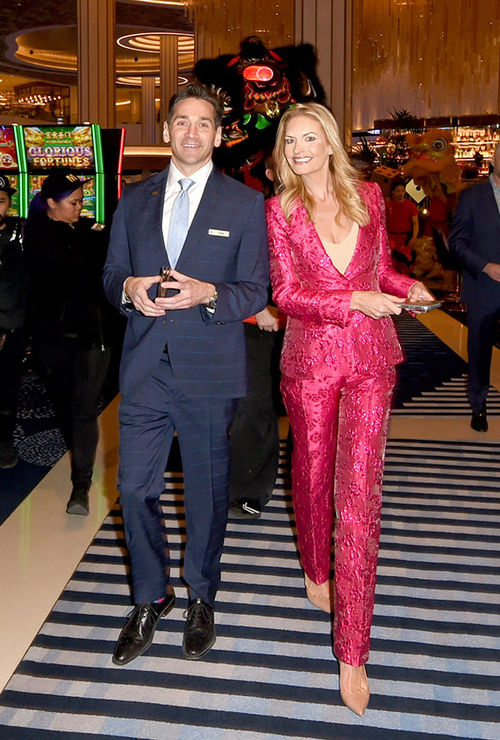Within the towering blue-glass façade of the Fontainebleau Las Vegas are gleaming white floors, walls and ceilings, elegant blue accents and countless representations of bowties.
A favorite of Fontainebleau Miami Beach architect Morris Lapidus, bowties are everywhere and easier to spot than right angles in all the glamorous, curvy spaces.
They're on the carpet and tiles, utensils and glassware, even on the bottom of the dangling chandelier crystals of the Bleau Bar, the centerpiece of the casino and what is sure to be a popular spot for photos to post on social media.
What would the late Lapidus think of the shimmering $3.7 billion resort, which opened on Dec. 13?
"I think he would be thrilled. ... tickled pink, or tickled blue," said COO Colleen Birch, after leading members of the media on a quick tour less than a week from its opening.
Birch was reminded of a Lapidus quote: "If you create the stage setting and it is grand, everyone who enters will play their part." And what a delightfully deco stage it is, from the majestic porte-cochere to the massive oval lobby with six artfully represented columns, from the serendipitously floral arrangements to the thought-provoking fine art.

Fontainebleau Las Vegas president Mark Tricano and COO Colleen Birch at the hotel's grand opening. Photo Credit: Vivien Killilea/Getty Images for Fontainebleau Las Vegas
Wavy textures, creamy colors and other flourishes articulate specific spaces but also work in concert to convey a glamorous aesthetic. Steep escalators throughout the high-ceilinged casino provide peek-a-boo moments -- glimpses that intrigue and engage guests. The escalators are practical, too, of course, helping guests limit their steps in what is a massive structure.
"Art, architecture and design are key components of our Fontainebleau culture and guest experience," Fontainebleau Development president Brett Mufson said. "The caliber of artists that we have collaborated with to create never-before-seen pieces that will be talked-about for generations is unprecedented."
At the southwest entrance is an interactive kinetic art sculpture, "Oceans" by Brooklyn-based Breakfast Studio.
Innovative spinning bricks called brixels compose the arch. Real-time data of ocean tides from around the world trigger its movements and transitions. The sculpture's curve mimics the shape of the Fontainebleau Miami Beach, while its marble and brass-tinted steel are inspired by the design ethos of the iconic 1950s property.
Another massive piece of art, "Lovers #3" by Swiss artist Urs Fischer, dominates the south lobby. The 46-foot sculpture, crafted from aluminum, stainless steel and gold leaf, depicts two forms meeting, one balanced on top of the other.

"Oceans" by Breakfast Studio is a kinetic sculpture that uses real-time data of ocean tides from around the world to trigger its movements and transitions. Photo Credit: Breakfast Studio
"Lovers #3 is the connective tissue that draws together a vast body of clever work, oscillating between the absurd and the unfeigned," Fischer said. "It's tender and torrid, enveloping and invigorating us through myriad emotions that invite us back into a post-lockdown world, where we seek to connect with individuals, experiences, and objects that genuinely feed our psyche."
Dining at Fontainebleau Las Vegas
Literally feeding guests in beautifully appointed restaurants is another Fontainebleau trademark.
David Grutman's Papi Steak at Fontainebleau Las Vegas, like its original Miami location, blends Hollywood swagger with David "Papi" Einhorn's modern sensibility to create a unique steakhouse. Lights and speakers are built into the walls to create a nightlife vibe.
Diners can order a "Beefcase," an Australian wagyu tomahawk, first brought to the table raw in a gold case with diamonds. The meat is branded amid a presentation of lights, music and smoke, then cooked in the kitchen and plated.

Lights and speakers are built into the walls to create a nightlife vibe at Papi Steak. Photo Credit: Jeff Green
Don's Prime, another steakhouse, evokes midcentury glamour, with trolley carts, tableside service, pre-Prohibition cocktails and prestigious wines. Successively more intimate green-, blue- and red-accented rooms add to the allure. Mother Wolf, chef Evan Funke's iteration of his L.A. spot, explores and conveys historic Italian cooking traditions and culture.
Bolstering the three dozen restaurants and lounges is the Promenade, a 600-seat food hall reminiscent of a European piazza, with coffee, bagels, burgers, tacos, sandwiches, omakase and Miami Slice pizza.
Collins, a bar adjacent to the lobby with a soundtrack of American classics and jazzy standards, is named after the avenue where Fontainebleau Miami Beach was built. The Nowhere bar and lounge is a reference to the iconic Lapidus-designed Stairway to Nowhere, a longtime spot for glamorously composed photos.

Southeast Asian restaurant Komodo features Peking duck, a sushi bar and rotating specials. Photo Credit: Jeff Green
Fontainebleau has hired just under 5,800 employees to help guests bring that Lapidus-inspired "stage" to life.
"You saw the beauty of the resort," Birch said. "But one of the things that we've invested a lot in is hiring and making sure that we get good fits, and then create a culture of collaboration and innovation. ... If we do that with each other, we believe that will translate into the way that we service our guests. Our intention is that our members find out something about the guests, the guests maybe find out something about the member, and then there could just be conversations."
Guest service that goes beyond tourists' typical transactional experiences is the goal, Birch said. "There's something to be said about lovely service but also having a bit of personality as delivered. So we can be very polite, and we can do that with personality, and if our team delivers on that, then I think we've done our job."